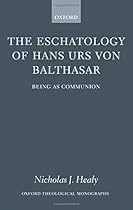The Eschatology of Hans Urs von Balthasar: Being As Communion (Oxford Theology and Religion Monographs)

| Author | : | |
| Rating | : | 4.19 (546 Votes) |
| Asin | : | 0199278369 |
| Format Type | : | paperback |
| Number of Pages | : | 232 Pages |
| Publish Date | : | 2015-04-08 |
| Language | : | English |
DESCRIPTION:
Difficult book but worth the effort Aquinas This first half of this book particularly concerning Von Balthasar's contribution to the Thomistic "esse"/"essence" dichotomy is very difficult indeed. I am glad however, even though I did not understand much of it, that I struggled on because the book contains some very rewarding insights, as follows:The goodness of creationOne of the most memorable quotes in the book is not from von Balthasar but from Schmemann:"We need water and oil, bread and wine in order to be in communion with God and to know Him. Yet conversely, it is this communion with God by means of "matter" that reveals the true meaning of
very fine bookHighly recommended. Cyrus P Olsen, The Journal of Theological Studies Some time ago, I consulted this book in thesis form in the Duke Humphrey Library in OxfordI am no less excited now that it has appeared as a book, elegant both in form and content, by turn passionate and lyrical Reviews in Religion and Theology a solid contribution to our appreciation of the intentions of the author of the Theo-Drama Francesca Aran Murphy, Scottish Journal of Theology . Rodney Howsare, Theology This book is a thought-provoking read Gerard Mannion, Theological Book Review The elegance of Healy's prose isa welcome aid to the reader: few texts so effortlessly sound the bass note of the Balthasarian fugue
The unifying centre of Nicholas J. Healy shows that the ultimate form of the end, and thus the measure of all that is meant by eschatology, is given in Christ's eucharistic and pneumatic gift of himself - a gift that simultaneously lays bare the mystery of God's trinitarian life and enables Christ to 'return' to the Father in communion with the whole of creation.. Healy's book is an analysis, in dialogue with the metaphysics of Thomas Aquinas, of Balthasar's understanding of the analogy of being. This discussion of analogy is framed by an interpretation of Balthasar's trinitarian eschatology
Healy is Director of the Austrian Program and Assistant Professor of Theology at Ave Maria University.. Nicholas J
